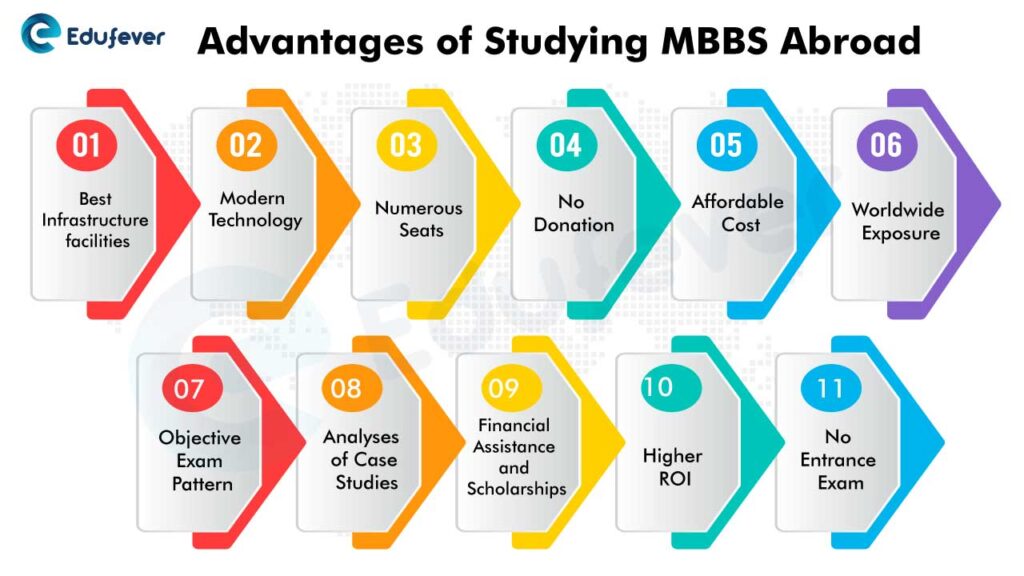Advantages and Disadvantages of MBBS Abroad for Indian Students: Studying MBBS in another country has benefits and drawbacks. Studying MBBS abroad for Indian Students can benefit from cutting-edge technology, exposure to other cultures and hands-on training. However, studying for the MBBS overseas has flaws like linguistic hurdles, cultural differences, environmental circumstances etc.
For various reasons, students from India want to pursue MBBS studies abroad. One of the reasons can be to practice medicine in another nation to settle there later. Students are often driven to apply to an MBBS school abroad due to the absence of medical seats in India. In this essay, we go into great detail about the Advantages and Disadvantages of MBBS Abroad for Indian Students.
[Page Index]
Advantages and Disadvantages of MBBS Abroad for Indian Students
In this section, we provide some information about the Advantages and Disadvantages of MBBS Abroad for Indian Students; students interested in studying MBBS Abroad must know the most important advantages and disadvantages of MBBS Abroad for Indian students. Let’s have a look.
| Advantages of MBBS Abroad for Indian Students | Disadvantages of MBBS Abroad for Indian Students |
| Best Infrastructure facilities | Language Barrier |
| Modern Technology | Risk of Fraudulent Universities |
| Numerous Seats | Diverse Academic Standards |
| No Donation | MCI /NMC Screening Test |
| Affordable Cost | Extreme climatic conditions |
| Worldwide Exposure | Internship training period |
| Objective Exam Pattern | – |
| Analyses of Case Studies | – |
| Financial Assistance and Scholarships | – |
| Higher ROI | – |
| No Entrance Exam | – |
Advantages of Studying MBBS Abroad for Indian Students
You’ll learn in this part why you should consider enrolling in an MBBS programme abroad. Following is a list of some benefits of studying MBBS abroad:
1. Best Infrastructure facilities
Foreign institutions offer world-class facilities and globally recognized degrees to international students. These colleges provide top-notch facilities and contemporary conveniences to ensure students have a positive educational experience. Additionally, international schools and universities offer students a high level of protection and safety so they can feel at ease while studying abroad.
2. Modern Technology
Most colleges that provide MBBS abroad uphold strict quality and technological criteria to accommodate domestic and international students. International colleges have raised their technical measures to draw and keep international students. Medical students can significantly benefit from using 3D and other cutting-edge technologies to learn new information and abilities.
3. Numerous Seats
Due to a lack of government college seats and expensive private university tuition, several medical hopefuls cannot pursue an MBBS in India. However, overseas institutions maintain low tuition costs, uphold solid academic standards, and offer many places to international students.
4. No Donation
In addition to their annual fees, private institutions in India often require a substantial donation or capitation fee. In contrast, foreign universities and colleges do not impose such fees. Students are only required to pay for admission and enrollment. Compared to Indian private universities, the annual tuition fees at foreign institutions, range from Rs. 2.5 lakhs to Rs. 4.5 lakhs, are relatively reasonable.
5. Affordable Cost
The overall cost of the medical course and associated living expenditures depends on where you decide to study abroad. Therefore, if one wishes to enrol in an affordable medical programme, it is crucial to carefully select a nation with good academic standards and low living expenses.

6. Worldwide Exposure
Although being away from home and adjusting to a new environment can be challenging for students studying abroad, they gain valuable exposure to other cultures. They will learn about all the most recent clinical techniques and receive firsthand knowledge that will be very helpful to them in the future during this course.
7. Objective Exam Pattern
All of India’s exams are based on arbitrary methodology, and kids have become accustomed to this pattern since they were little. Only competitive exams like NEET use an objective question style in Indian medical institutes. However, this approach is used primarily by international medical universities for regular assignments and tests that demand a deep comprehension of subjects.
8. Analyses of Case Studies
Most medical colleges abroad use case study- and interaction-based coursework, allowing the students to observe and learn about illnesses and treatment options firsthand. Case study analysis is not utilized very frequently in Indian medical institutes. Students will, therefore, obtain more extraordinary practical experience by studying MBBS abroad.
9. Financial Assistance and Scholarships
Universities and organizations have offered various scholarships and cash prizes to entice students to study MBBS abroad. The government, colleges and private and public organizations provide these scholarships. The size and perks of scholarships vary by nation and institution.
10. Higher ROI
After completing their training, students are allowed to practice in another country. They can thus make a lot of money and get a greater return on their investment over time. Comparatively speaking, an MBBS abroad is equally affordable as a private university in India.
11. No Entrance Exam
For the first time in India, no entrance exam is necessary to gain admission to an MBBS college. Your entry will be granted on a first-come, first-served basis and entirely based on your performance in the 12th grade. Preference is given to students with a grade point average of at least 75% in their 12th standard.
Graphical Representation of Advantages of studying MBBS abroad

Disadvantages of studying MBBS Abroad for Indian students
Each student’s experience while pursuing an MBBS overseas will be unique. Some pupils might experience problems as a result of specific factors. The following are some drawbacks of MBBS study abroad:
1. Language Barrier
China, Russia, Poland, Ukraine, and other famous MBBS studies abroad destinations are listed here. The use of English is not every day in these nations. This limits the possibilities available to Indian students who do not speak the local language. While universities serving the international diaspora will offer English programmes, students fluent in their native tongue will always be at an advantage.
2. Risk of Fraudulent Universities
While there are many benefits to studying medicine overseas, several fraudulent universities and institutions fall short of expectations. These colleges frequently claim that they offer admission without an entrance exam. Students need to exercise caution and steer clear of such frauds. The Medical Council of India (MCI/NMC) has supplied a list of prestigious colleges and universities approved by NMC. It offers top-notch instruction to students applying for MBBS overseas to decrease this worry.
3. Diverse Academic Standards
Each nation will provide MBBS students with a distinctive educational experience. Therefore, it is imperative to understand the curriculum before applying to any foreign university. Along with academic standards, medical procedures will vary from university to university. As a result, students should study thoroughly before applying to their chosen universities. It would also be advantageous to talk to former and current college students at these times.
4. NMC Screening Test:
Returning to India to practice is always an option for students. Students who have earned their MBBS degree outside of their home country must pass the MCI/ NMC-approved Foreign Medical Graduates Examination (FMGE) to practice medicine there. Some Indian students may find the FMGE difficult. With sufficient preparation from a medical student, it’s not difficult to pass any licensure exams and the good news is that the pass rate for current aspirants is rising.
5. Extreme climatic conditions:
Indian students find it challenging to adapt to a few places where the environment is particularly extreme. However, there are other nations with climates that are comparable to India’s. Therefore, students must be careful when selecting their university to ensure they can easily live and study in the nation.
6. Internship training period:
International students are not allowed to touch patients while completing internships at hospitals. In these circumstances, the training only takes the shape of an observership. Since they only practice on dummies and not real people, they cannot get practical experience.


Such a piece of excellent information for students.
Such a piece of excellent information for students. I highly recommend it to the students. Keep doing the great work.
good and helpful
Thanks for your valuable comment.